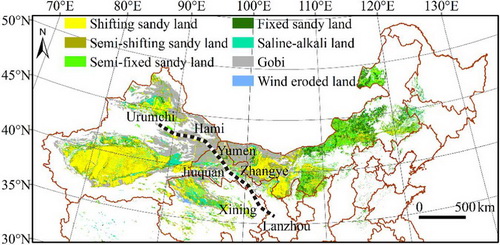A Possibility to Estimate Wind Erosion from Construction Works
Updatetime:2017-06-21From:
【Enlarge】【Reduce】
Wind erosion is known as a major cause for land degradation and air pollution, and wind erosion from construction zones or disturbed sites are almost always a threat to the air quality of downwind areas.
To reduce unwanted environmental and ecological problems relating to wind eroded dust from construction sites, it is important to have a good planning tool. Such a tool must be able to estimate emissions that reflect local surface and climate conditions for various working schedules and different construction activities.
However, there is currently no specific wind erosion model for simulating dust emissions from construction activities, mostly due to a lack of knowledge. Recently, a research group of Prof. QU Jianjun from the Dunhuang Gobi Desert Research Station, Key Laboratory of Desert and Desertification, Northwest Institute of Eco-Environment and Resources of the Chinese Academy of Sciences proposed a new method to address this problem.
In this study, The Wind Erosion Prediction System and the United States Environmental Protection Agency’s AP 42 emission factors formula, were combined together to evaluate wind-blown dust emissions from various construction units from a railway construction project in the dry Gobi land in Northwest China. The authors used available methods and data to estimate wind erosion from different construction types including the construction of roadbeds, bridges, plantings, earth barrow pit and spoil areas, as well as transportation from unpaved or simple-processed minimally improved gravel construction roads from a working section of the Lanzhou-Xinjiang Second double-line Railway (LXS) project.
This work provided a targeted and simple applicable method for end users, which will hopefully lead to suggestions in how to improve current wind erosion models for construction site applications.
The results and procedures are now published in the journal International Soil and Water Conservation Research with the title of “Estimation of Wind Erosion from Construction of a Railway in Arid Northwest China”.
The lead authors (LIU Benli and QU Jianjun) of this research are financially supported by the National Science Foundation of China (1501008), the Youth Innovation Promotion Association (2016373) and the “Light of West China” Program of the Chinese Academy of Sciences.
Contact:
LIU Benli
E-mail: liubenli@lzb.ac.cn
The Dunhuang Gobi Desert Research Station, Key Laboratory of Desert and Desertification, Northwest Institute of Eco-Environment and Resources of the Chinese Academy of Sciences, 730000 Lanzhou, China.

Location of the LXS project and its Aeolian landform background (Image by LIU Benli)
Appendix




